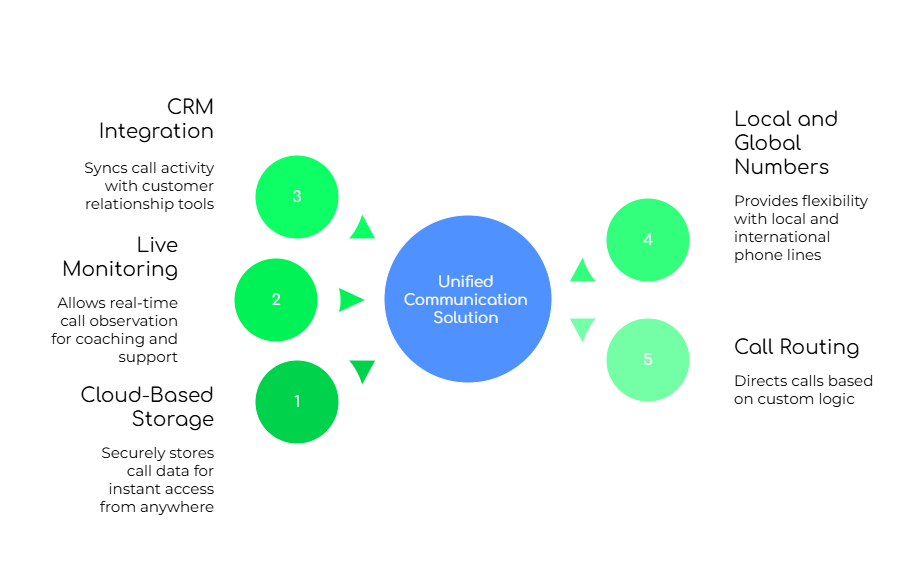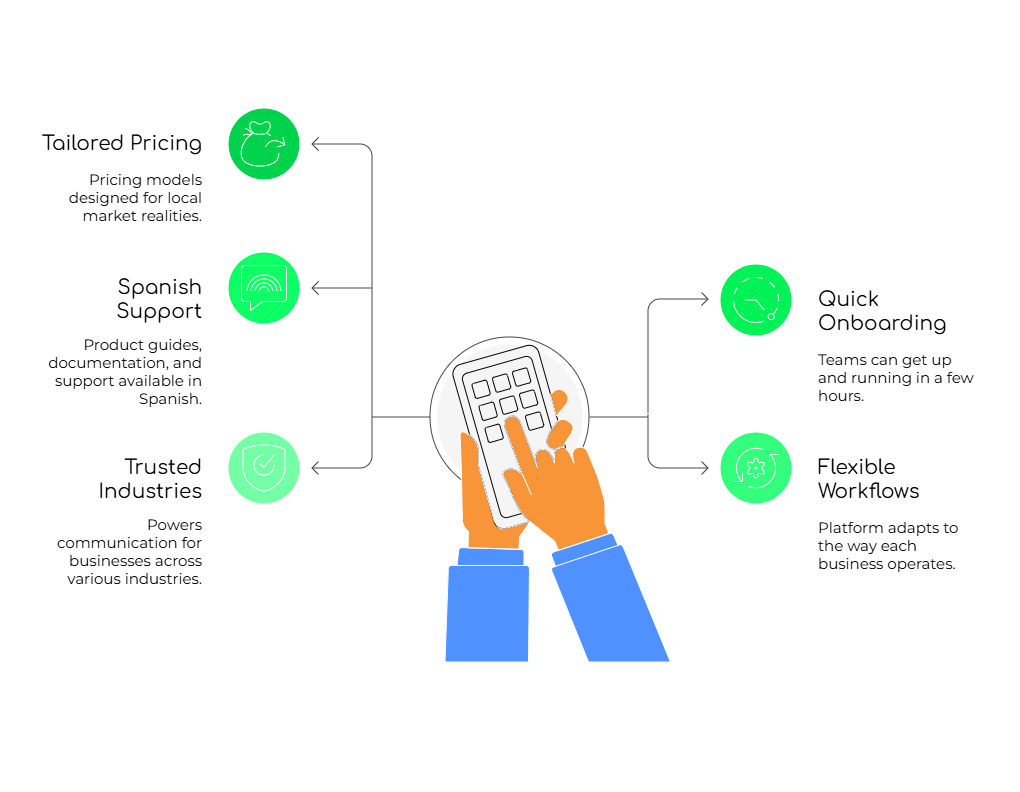How do you keep your team aligned when they’re working miles apart from Buenos Aires to Córdoba to Salta, each using different devices, operating on different schedules, and managing their day-to-day chaos? That’s the reality for a growing number of businesses in Argentina today. Remote work has moved past the experimental stage and become a core part of how teams operate. A missed follow-up, a dropped call, or an unrecorded customer conversation can easily snowball into lost business or internal confusion. That’s why Softphone Implementation in Argentina is becoming essential not just for enabling remote calls but for bringing structure, accountability, and reliability to every customer interaction.
According to the Ministry of Labor in Argentina, this shift is already transforming how companies hire, train, and collaborate. That’s where softphone solutions step in, bridging the gap between remote flexibility and business-grade reliability. They give growing teams a professional way to manage calls, access records, and stay in sync no matter where they’re working from. For companies looking to grow without growing apart, softphones are quickly becoming an essential part of the digital toolkit.
Why Remote Teams in Argentina Need Better Communication?
Argentina’s workforce has undergone a fundamental transformation. More companies, especially startups and SMBs, are adopting hybrid and fully remote models. Offices are no longer the default. Teams are now collaborating across cities, provinces, and even international borders. But while flexibility has improved, communication has become more fragmented. It’s one thing to enable remote work, it’s another to make it truly efficient. Personal devices blur boundaries. Context gets lost in endless threads. And when communication breaks down, decision-making slows, customer experience suffers, and growth stalls.

Remote teams in Argentina don’t just need more tools; they need better ones. They need secure, scalable systems built to keep everyone productive, accountable, and connected across time zones. High-growth environments often include cross-functional teams working across sales, support, and tech. Everyone needs access to the same information, the same contact history, and the same tools, no matter where they’re working from. Managing that complexity requires systems that centralize communication, eliminate context switching, and provide full visibility into every customer interaction.
Without this kind of foundation, remote collaboration turns into a guessing game. FreJun offers a clear advantage for Argentine businesses navigating this shift. Unlike basic call apps or temporary fixes, FreJun delivers a complete softphone platform designed for business-grade communication. No chaos, no silos, no dropped calls. Just consistent, professional communication that scales with your team, including streamlined Softphone Implementation in Argentina for better customer engagement and internal visibility.
Key Challenges Faced by Distributed Teams
Remote teams unlock flexibility and open doors to a much broader talent pool. Businesses in Argentina are no longer limited to hiring within commuting distance; they’re building teams across provinces, time zones, and even countries.
Here are a few consistent hurdles:

- Scattered Communication Channels: Bouncing between personal WhatsApp messages, Zoom calls, internal emails, and shared docs creates silos. Conversations get buried, decisions don’t get documented, and people start operating without full context, leading to duplicated work and missed follow-ups.
- Lack of Visibility: Managers have no easy way to see who spoke to which client, what was said, or when the last touchpoint happened. Without that visibility, it’s hard to coach teams, spot issues early, or make informed decisions.
- Poor Audio Quality: Call lags, distortion, and sudden drops aren’t just annoying; they damage credibility. Clients lose confidence when they can’t hear you clearly, and internal calls become frustrating instead of productive.
- No Unified History: When employees leave or change roles, valuable call histories and customer insights often disappear with them. That kind of knowledge loss breaks continuity and leaves new team members starting from scratch.
- Security Concerns: Many teams use free or consumer-grade apps to manage sensitive client conversations. Those tools often lack basic safeguards like encryption, access control, or compliance logs, putting customer trust and business data at serious risk.
That’s why remote teams need more than just digital tools. They need purpose-built solutions designed to scale with the way modern teams work, including smart systems for Softphone Implementation in Argentina that ensure no message or conversation slips through the cracks.
How FreJun Enhances Remote Collaboration

FreJun steps in as a single solution that not only addresses all of those communication challenges, but goes far beyond. Instead of patching gaps with multiple disconnected tools, FreJun brings everything under one roof, including smart features for Softphone Implementation in Argentina, and gives remote teams a system that’s built for real business needs.
- Cloud-Based Storage: Call recordings and metadata are securely stored in the cloud, giving teams instant access from any location. Whether someone is working from home, a café, or another country, everything they need is just a login away, no VPNs, no physical servers.
- Live Monitoring: Team leads and supervisors can listen in on ongoing calls without disrupting the conversation. This helps with real-time coaching, quality checks, and immediate support when junior reps need backup mid-call.
- CRM Integration: Call activity syncs automatically with customer relationship tools. That means no more copy-pasting notes or trying to remember what happened on a call, client histories update in real time, so every stakeholder stays informed.
- Local and Global Numbers: Teams can operate using Argentina-based phone numbers or toll-free international lines. This builds trust with local clients while maintaining flexibility to expand globally without having to set up new infrastructure.
- Call Routing: FreJun routes incoming calls based on custom logic, including working hours, agent specialization, language preference, or region. No more juggling handoffs or manually forwarding calls between departments.
In remote-first teams, clarity is king. FreJun makes sure every conversation is captured, every insight is preserved, and every call contributes to smarter, more coordinated work.
FreJun’s Softphone Features for Growing Teams
Whether the team includes five people or fifty, FreJun fits right into the workflow and grows alongside the business. For SMEs in Argentina, navigating fast changes and limited resources, adaptability and ease of use aren’t just nice to have; they’re essential. FreJun makes setup effortless and scaling stress-free, while also supporting Softphone Implementation in Argentina as part of a unified communication system.

- Stable HD Calls: Built on intelligent routing and modern codecs, calls remain clear and uninterrupted, even in low-bandwidth areas. This makes a huge difference for remote teams spread across regions with varying internet quality.
- Secure Call Recordings: All calls are stored on encrypted, cloud-based servers that align with global compliance standards. Sensitive customer data stays protected, even during audits or staff transitions.
- Detailed Analytics: Managers can quickly pull reports on call duration, response times, missed calls, and agent performance. This helps identify bottlenecks, reward top performers, and improve service across the board.
- Click-to-Call: Agents can initiate calls directly from CRMs, ticketing tools, or sales platforms with a single click, no app switching, no dial pad errors. Time is saved, and outreach becomes faster and more precise.
- Smart Contact Syncing: Contacts are automatically updated across devices and team members. When a lead or client detail changes, the entire team stays in sync without manual updates.
For SMEs looking to grow without growing disorganized, FreJun offers a communication backbone that’s simple to adopt, powerful to use, and ready for scale.
Why Businesses in Argentina Prefer FreJun
Whether you’re a startup hiring your first remote team or an established SME scaling into new regions, the platform delivers not just features, but support, flexibility, and stability where it matters most.

1. Tailored Pricing for Growing Businesses
Small teams often face enterprise-level pricing for tools they barely use. FreJun avoids that trap with pricing models designed for local market realities, giving startups and SMEs access to premium calling features without draining their budget.
2. Onboarding in Hours, Not Weeks
Lengthy setups and IT overhead slow growth. FreJun eliminates both. Teams can get up and running in a few hours with zero technical knowledge, making it easy for lean operations to move fast without bottlenecks or dependencies.
3. Support and Training in Spanish
Language shouldn’t be a barrier to effective adoption. Plus, Softphone Implementation in Argentina is fully supported, making FreJun a practical fit for teams already using the country’s most popular messaging platform for business conversations.
4. Designed Around Real Workflows
Every team works differently, and FreJun respects that. Instead of forcing rigid structures, the platform adapts to the way each business operates, from call routing logic to custom tagging and role-based permissions.
5. Trusted by Leading Local Industries
FreJun powers communication for businesses across fintech, healthcare, logistics, and more. Its flexibility, reliability, and local infrastructure make it the go-to softphone solution for remote-ready companies throughout Argentina, fully aligned with the teletrabajo guidelines provided by the Argentine government’s official portal for remote work
Key Takeaways

Remote work doesn’t just shift the workplace; it transforms the way teams collaborate, solve problems, and interact with customers. For businesses in Argentina, especially those growing quickly or managing distributed teams, communication becomes the backbone of everything. Relying on scattered tools like personal messaging apps, unsynced CRMs, or inconsistent call systems creates friction and confusion. Better communication isn’t just about staying in touch; it’s about accelerating workflows, improving decision-making, and delivering a consistently professional experience to clients and colleagues alike.
FreJun addresses all of these needs in one platform. Whether the priority is customer support, internal coordination, Softphone Implementation in Argentina, or outbound sales, FreJun delivers the tools and structure that transform remote communication from a challenge into a competitive advantage.
Final Thoughts

Remote work is no longer just a temporary fix or an employee perk; it’s the foundation of how modern teams operate. FreJun changes that dynamic completely. Instead of layering on more tools to solve the same old problems, companies get a single, unified platform that simplifies communication and gives teams a strong foundation to work smarter and grow faster.
FreJun doesn’t just help businesses stay connected; it helps them operate like the modern, remote-first teams they aspire to be. With intuitive dashboards, secure storage, seamless CRM sync, and tools built for both speed and scale, FreJun offers more than features; it delivers operational clarity. From onboarding to analytics, every element is designed to support real business goals. For Argentine teams ready to move from makeshift tools to meaningful structure, FreJun provides not just a better way to communicate but a smarter way to grow, especially with Softphone Implementation in Argentina.
Further Reading – Get UAE Number Online: Top 5 Platforms Compared
FAQ
FreJun delivers high-definition call quality using optimized routing and reliable cloud infrastructure, ensuring every conversation is smooth and uninterrupted.
FreJun offers a centralized platform where every call, contact, and log is automatically stored and organized for quick access, visibility, and accountability.
FreJun connects directly with major CRMs, keeping all client interactions synced in real time and reducing manual data entry for sales and support teams.
FreJun supports live call monitoring, whisper coaching, and call tagging, helping team leads onboard agents quickly while maintaining quality and speed.
FreJun uses enterprise-grade encryption and secure cloud storage, protecting all conversations and ensuring compliance with industry privacy standards.
